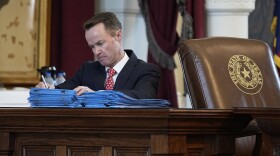Jennifer Sarver said she considers herself a conservative — but no longer a Republican.
Sarver worked in President George W. Bush’s administration. She also ran for Congress as a Republican in 2018 for the seat Representative Chip Roy now holds. But she said the rising extremism in the Republican Party today doesn’t represent her values.
“I remember a time when Republicans stood for limited government, local control and personal responsibility and accountability,” she said. “And it seems like every time I turn around, we're doing the opposite.”
The Texas Republican Party is dealing with internal turmoil while still maintaining its grip on power. Some lifelong Republicans like Sarver say the party has become too extreme for them, but they’re still conservatives. How they deal with the political realities in Texas vary. Some have voted for Democrats. Others may sit home on election day. And some may even vote for Republican candidates, despite their many misgivings.
Sarver said things changed in the GOP when President Donald Trump got involved in 2016 — and not for the better.
“The politics of personal divisiveness and this toxic rhetoric that carries people down instead of building them up is not who we all are,” she said.
Sarver said she couldn’t bring herself to vote for Trump because of how he talks about women. She said his rhetoric about People of Color and the LGBTQ+ community pushes people away from the Republican Party.
Some political scientists say personality and loyalty to certain Republican politicians like Trump and Attorney General Ken Paxton have become paramount in the GOP. Staunch conservatives in the Texas House have been accused of being RINOs – that’s a Republican in Name Only — because they voted to impeach Attorney General Ken Paxton. Chris Walsh from the Bush Institute at said accusations like that have become more common in politics as polarization increases.
“You’re seeing these political purity tests and political parties, where not even the slightest bit of dissent is allowed or welcome,” Walsh said.
He said those expectations makes it harder for elected officials to work across the aisle — something that helps make legislation stronger and more likely to pass.
Despite their misgivings, many conservatives who are unhappy with the direction of the GOP still vote for Republican candidates. But some are leaving the party and voting for other candidates. Marc Riggs told KERA at a McKinney Area Democrats happy hour that Trump made him move to the left.
“It’s a different direction for me, but in my final years on this earth, I want to be with good people that care about our country and support our democracy,” Riggs said.
Joe Straus, the former Texas Speaker of the House, said on the Texas Tribune’s politics podcast Point of Order in 2021 that he voted for President Joe Biden — even though he doesn’t support Biden’s policies.
“Some things are bigger than partisanship,” Straus said. “And so, I did, I crossed over first time in my life. I voted for a Democrat for president.”
Straus is supporting Nikki Haley in the Republican presidential primary race.
Governor Greg Abbott has endorsed several of the Texas House incumbents who voted to impeach Paxton. A recent study from the University of Houston found that 64% of Republican primary voters said they are more likely to support a candidate endorsed by Abbott, compared to 40% who said the same about Paxton.
But voter turnout during the primary is a lot lower than the general election. And people who hit the polls during the primary tend to be more extreme in their views when choosing a candidate. Sarver says that has consequences.
“If people are getting elected because of their extreme rhetoric and their extreme policies in the primary, they're going to govern that way,” she said.
Sarver said the best solution is for more people to vote in the primary. She’s part of a nonpartisan group called March Matters that aims to increase primary voter turnout.
Early voting for the primary ends Friday. Election day is March 5.
Got a tip? Email Caroline Love at clove@kera.org.
Caroline Love is a Report For AmericaCorps member for KERA News.
KERA News is made possible through the generosity of our members. If you find this reporting valuable, consider making a tax-deductible gift today. Thank you.
_






